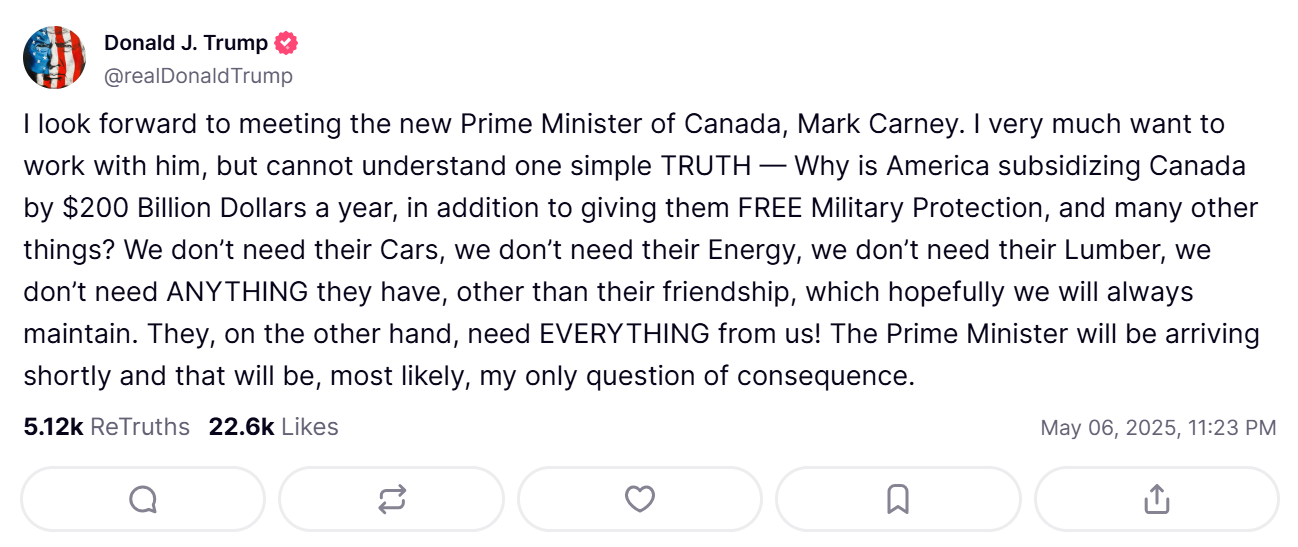Trump praises Carney and agrees to more talks, but offers no relief on Canada–US trade barriers

Prime Minister Mark Carney and US President Donald Trump held their first official meeting at the White House on May 6, a half-day summit that opened with praise but underscored the tension over trade and sovereignty.
According to CTV News, Trump congratulated Carney on his election win and called him “a very talented person,” while Carney responded by calling Trump a “transformational president” with a “relentless focus on the American worker.”
Despite the cordial start, the leaders made no breakthrough on tariffs.
When asked whether Carney had said anything to justify removing US tariffs on Canadian goods, Trump replied, “No,” adding “it’s just the way it is”.
Carney told reporters in French that “we did make progress,” but he “wasn’t expecting that we would be sending out white smoke from here.”
The issue of sovereignty re-emerged during the public portion of the meeting.
Following the meeting, Carney told reporters at the Canadian embassy in Washington that “the question is how we will cooperate in the future.”
Thank you to President Trump for inviting me to the White House.
— Mark Carney (@MarkJCarney) May 6, 2025
Our meeting today marks the beginning of a new relationship between Canada and the United States — based on respect, built on common interests, and to the transformational benefit of both our nations. pic.twitter.com/B5pSnr4ilo
He posted on X that the meeting marked “the beginning of a new relationship between Canada and the United States — based on respect, built on common interests, and to the transformational benefit of both our nations.”
According to Al Jazeera, Trump again raised the idea of Canada becoming a US state, claiming it would result in a “massive tax cut” and “tremendous medical care.”
Carney replied that “there are some places that are never for sale,” and stated that Canada “won’t be for sale — ever.”
As per CTV News, when Trump responded “Never say never,” Carney appeared to silently mouth “never” five times.
Carney also said in French, “I told him there is no need to repeat that idea,” referring to the statehood suggestion, but acknowledged that “the president is going to say whatever he wants.”
According to CBC, Trump later conceded that the idea was “likely off the table,” saying, “It takes two to tango.”
Trump repeatedly framed the US-Canada trade imbalance as a subsidy.
He posted on Truth Social that the US “subsidizes Canada by $200 Billion Dollars a year.”

Although CTV News noted that the US Census Bureau reported a trade deficit with Canada of just over US$63bn in 2023.
Trump also claimed, “We don’t need their cars… or steel,” adding, “They need EVERYTHING from us!”
Frank McKenna, former Canadian ambassador to the US, challenged that assertion. McKenna said, “These are not true statements,” noting that Canada produces about 10 percent of North American autos and exports vital resources like potash, oil, and gas to the US.
Carney, referring to the Canada-US-Mexico Agreement (CUSMA), said the deal “is a basis for a broader negotiation,” and “some things about it are going to have to change.”
As reported by The Guardian, Trump agreed there may be “subtle changes” to the deal and described the prior NAFTA agreement as “the worst in the history of the world.”
Trump later said that Canada’s biggest concession could simply be “friendship.”
Carney responded by pointing to Canada’s economic integration, stating, “We are the largest client of the United States in the totality of all the goods.”
Ontario Premier Doug Ford described the meeting as “very productive” and said “Carney held his own,” adding, “It’s very obvious that President Trump likes Prime Minister Carney a lot more than he liked (former) prime minister Trudeau,” according to CTVNewsToronto.ca.
Ford had earlier told CNN he supported building an “Am-Can fortress” for mutual prosperity.
Conservative Leader Pierre Poilievre told CTV News that he hoped the meeting would result in the US “honouring our sovereignty and signal an end to these tariffs,” adding, “Let’s get a deal hammered out.”
According to CBC, a senior Canadian official said Carney challenged Trump’s justification for fentanyl-linked tariffs by pointing out Canada is not a major source of the drug.
US Customs and Border Protection had reported only five kilograms seized at the northern border this year, compared to over 3,000 kilograms at the southern border.
Trade experts also weighed in. Scott Reid, Canada should use potential defence collaborations and equipment contracts for leverage, arguing Carney must balance flattery with firmness.
“Trump knows about Mark Carney. There’s a certain degree of respect,” Reid said.
California Governor Gavin Newsom told CTV’s Power Play he was “very hopeful” the conversation would be fruitful. While refusing to give direct advice, he said Carney should enter the talks with “points of pride” and “assert yourself.”
Former US Secretary of State Mike Pompeo told Fox News that Carney was “much closer” to Trump in terms of experience than Trudeau, calling the former prime minister “difficult.”
As per CBC, Trump echoed that sentiment, referring to Trudeau as “the governor” and saying he “didn’t like his predecessor.”
Body language expert Mark Bowden told CTV News that Trump’s handshake signalled “a certain level of respect,” noting that Trump did not attempt to pull Carney off balance as he often does with other leaders.
However, Bowden criticised Carney’s ability to interrupt, stating, “His raising of a finger doesn’t get Trump to stop,” and suggesting more assertive gestures.
Carney’s delegation included International Trade Minister Dominic LeBlanc, Foreign Affairs Minister Mélanie Joly, Public Safety Minister David McGuinty, and Ambassador Kirsten Hillman.
On the US side were Vice-President JD Vance, Secretary of State Marco Rubio, Commerce Secretary Howard Lutnick, and US Trade Representative Jamieson Greer.



